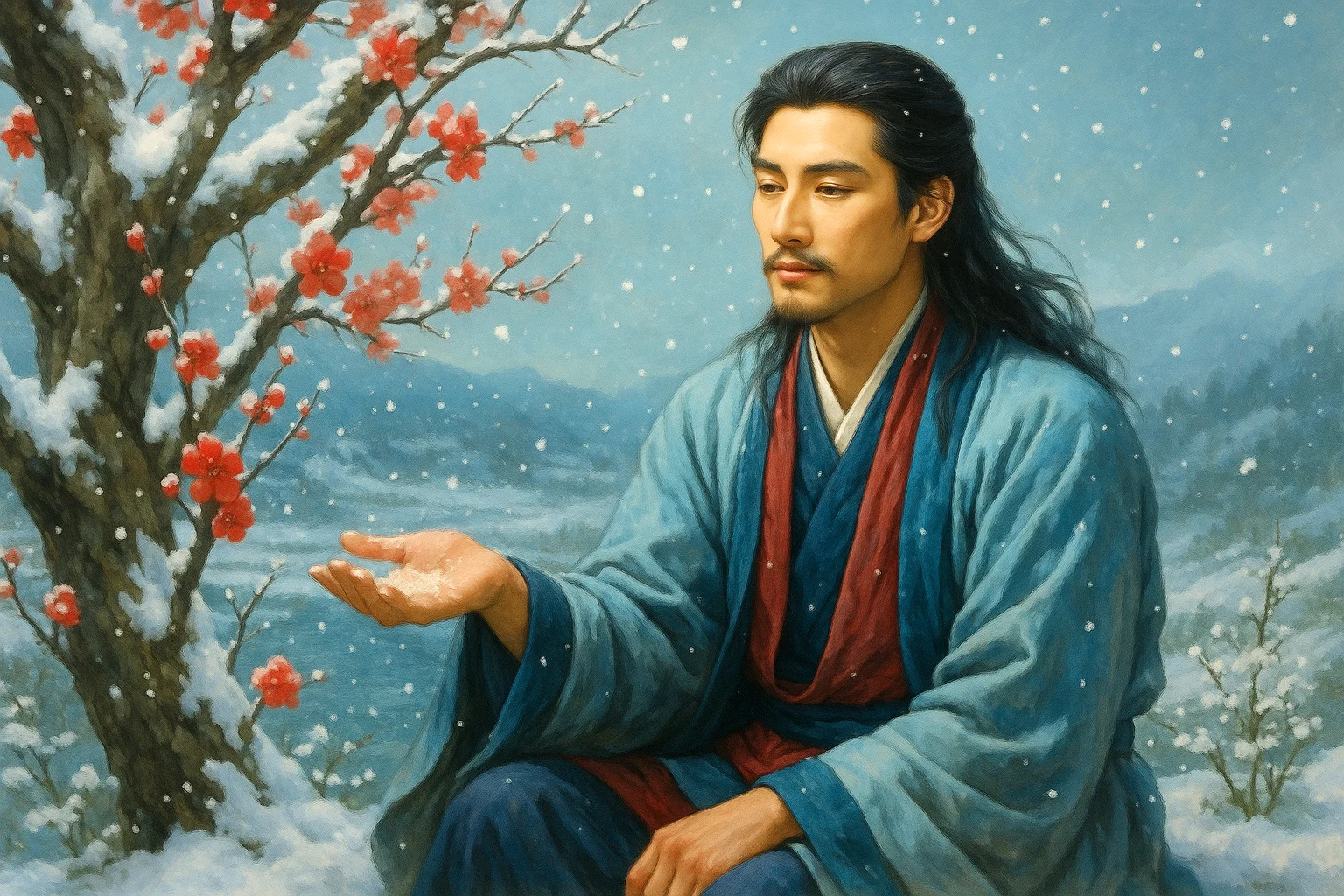Aged, I've no heart for flute and string,
Ill, even wine can bring no comforting.
Life's rarest gift? Rain before autumn's sigh -
Grant me empty hall's unburdened slumber high.
Original Poem
「平甫见招不欲往」
姜夔
老去无心听管弦,病来杯酒不相便。
人生难得秋前雨,乞我虚堂自在眠。
Interpretation
Composed between 1193 and 1202 during Jiang Kui's residence in Hangzhou, this poem reflects his close friendship with Zhang Jian (styled Pingfu), a descendant of the renowned Southern Song general Zhang Jun. When invited to a banquet, the poet—disinclined to attend—penned this graceful refusal. Beneath its surface modesty lies profound emotional depth, where declining due to "illness" becomes a metaphor for his increasingly reclusive spirit and yearning for quietude.
First Couplet: "老去无心听管弦,病来杯酒不相便。"
Lǎo qù wúxīn tīng guǎnxián, bìng lái bēi jiǔ bù xiāng biàn.
Age has stilled my ear for pipes and strings;
Illness makes even a cup of wine unkind.
The poet states his case plainly: advancing years and frail health preclude festive gatherings. "Ear for pipes and strings" (听管弦) subtly conveys his detachment from social bustle, while "wine unkind" (杯酒不相便) lends somatic legitimacy to his refusal. Though citing decline, the tone remains serenely self-possessed.
Second Couplet: "人生难得秋前雨,乞我虚堂自在眠。"
Rénshēng nándé qiū qián yǔ, qǐ wǒ xū táng zìzài mián.
How rare this pre-autumn rain—instead,
Grant me my empty hall and tranquil bed.
Here, the mood lifts toward contemplative solace. The "pre-autumn rain" (秋前雨), with its cooling freshness, symbolizes nature's restorative simplicity. "Empty hall" (虚堂) and "tranquil bed" (自在眠) epitomize his spiritual refuge. With deceptive lightness, the couplet articulates a philosophy of serene self-sufficiency, resonating far beyond its literal meaning.
Holistic Appreciation
The poem is simply conceived, its tone calm and conversational, gently explaining the reason for declining an invitation. Its style is natural and unhurried. On the surface, it is a polite refusal to a friend's request, but beneath lies the poet's late-life detachment—a pursuit of inner tranquility. There is no affectation in his refusal, no pretense of moral superiority; instead, he cites "age" and "illness" as reasons. Though seemingly plain, these words carry profound reflections on life.
The pairing of "autumn rain" and "empty hall repose" forms the heart of the poem—a serene, elegant scene emerges: early autumn, light rain tapping, quiet slumber in a still room. This imagery reflects the poet's transcendence over worldly clamor. In the interplay between absence and presence, movement and stillness, the poet positions himself beyond mundane concerns, leaning toward a deeper spiritual independence.
Artistic Merits
Written in the seven-character quatrain form, the poem employs extremely simple, unadorned language, yet its shifts in tone create layers of meaning. From "no heart for pipes and strings" to "repose at ease," from "a cup of wine ill suits me" to "autumn rain before fall," the poet skillfully uses everyday details to construct a state of mind, revealing his refined sensibilities through delicate depiction.
Notably, though the poem conveys refusal, it never feels perfunctory. Instead, it brims with sincerity and a gentle tone. The phrase "beg of me" (乞我) particularly highlights humility, forming a tender transition with the earlier lines of "declining." This ensures the poem remains warm and considerate, balancing courtesy with personal conviction.
Insights
In a world dominated by social obligations, the art of graceful yet firm refusal is a mark of wisdom. Jiang Kui’s short poem demonstrates a tactful way to decline—honoring both propriety and one’s own principles. More importantly, within this common social scenario, he reveals an insightful, poetic approach to life’s rhythms: How rare are moments of quietude? If one can savor solitary rest in an autumn-drenched room, is it not worth more than worldly splendor? Faced with life’s pressures, we might learn from the poet—to preserve self-composure and choose harmony with our own spirits.
About the poet

Jiang Kui (姜夔, c. 1155 - 1221), a native of Poyang, Jiangxi, was a Southern Song Dynasty lyric poet and musician. He remained a commoner throughout his life. His lyrics are known for their ethereal and austere style, and his poetry is also highly regarded. Along with Fan Chengda and Yang Wanli, he is celebrated as one of the "Four Great Masters of the Restoration."












